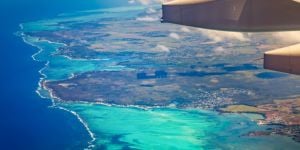
Mauritius is entering a crucial phase in its environmental commitment. Recent efforts by government authorities, bolstered by public support, set the stage for a future where environmental preservation is a priority. To overcome ongoing challenges, a thorough and unified approach is necessary to turn these ambitions into sustainable outcomes.
Revoking permits to protect sensitive areas: A strong signal
The cancellation of the Environmental Impact Assessment (EIA) permit for Atalian Global Services, which aimed to build hotels on a former salt marsh at Les Salines, marks a significant shift. This project had been widely opposed by ecologists and community groups due to its potential damage to a delicate ecosystem. The decision to revoke the permit indicates that authorities are now paying attention to environmental advocates, like the NGO Mru2025, which celebrated this victory on social media.
However, the impact of this decision extends beyond Les Salines. It reflects a wider movement toward protecting vulnerable areas from unchecked urbanization. Actions such as demolishing illegal constructions on Île aux Bénitiers and scheduling inspections on other islets to prevent illegal dumping and exploitation underscore a commitment to preserving Mauritius's ecological treasures. These measures also emphasize the need for improved oversight and management to ensure the sustainable use of natural resources and prevent future abuses. Maintaining transparency and accountability is crucial to this effort, helping to ensure that past errors are not repeated.
Sustainable development: Striking a complex balance
The ongoing tension between economic growth and environmental conservation presents continual challenges. Initiatives like the Roches Noires Smart City and the villas at Bel-Ombre exemplify the difficulty in maintaining this balance. While some projects undergo rigorous Environmental Impact Assessments (EIA) or face temporary halts, others highlight the gaps in current legislation.
A case in point is the construction of 42 villas at Bel-Ombre, an ecologically vulnerable area, which proceeded without a mandated EIA. This oversight signals a need for tightening the Environment Act of 2024 to better govern future developments.
The critical question remains: How can we align economic development with environmental protection? Although authorities recognize this need, their efforts are still piecemeal. A more holistic approach, mandating stringent environmental standards across all development projects, would mark substantial progress. This strategy would ensure that economic advancements do not come at the expense of ecological health.
Enhancing cooperation between tourism and environmental protection
Minister of Tourism Richard Duval's recent visit to the southwest coast and Île aux Bénitiers on January 16 signifies a pivotal move towards improved coordination between tourism development and environmental conservation. During this visit, the minister revealed plans for consultations aimed at reinforcing the collaboration between the Tourism Authority and the Beach Authority, which is part of the Ministry of the Environment.
This initiative is designed to more effectively regulate tourist activities, such as sea excursions and beach vending, while safeguarding vulnerable ecosystems. By linking tourism with environmental stewardship, Mauritius is positioning itself to be a leader in sustainable development. This approach promises a future where economic progress and ecological protection are mutually supportive, setting a standard for others to follow.
The war against plastic: Navigating complex trade-offs
Managing single-use plastic presents a significant challenge. The government has extended the moratorium on banning non-biodegradable plastic products until 2026. This decision is intended to provide businesses more time to adjust, but it also delays the shift toward sustainable alternatives.
This scenario underscores a broader conundrum: how can we implement drastic environmental changes without harming the local economy? The formation of a Multi-Stakeholder Technical Committee to oversee this transition is a promising step. However, it must be bolstered by tangible support for businesses to adopt environmentally friendly practices. Additionally, launching a comprehensive public awareness campaign is crucial to curbing the reliance on plastics, ensuring that both the economy and the environment benefit from these policies.
The water crisis: A reflection of climate change
Water resource management has emerged as a critical issue. With reservoir levels at only 43.1%, Mauritius is experiencing a severe water shortage. Although new water distribution schedules have been implemented as a short-term measure, these alone are insufficient for addressing the long-term challenges.
This crisis is a clear indication of the broader impacts of climate change, which intensifies weather extremes—from droughts to floods. Michaël Atchia, a climate expert, suggests that innovative technologies like anti-evaporation balls or methods to enhance cloud condensation might be part of the solution. However, these technologies need to be integrated into a broader strategy that includes aquifer rehabilitation and the adoption of sustainable agricultural practices. This comprehensive approach is essential to effectively manage water resources in the face of escalating climate challenges.
Towards a new environmental culture in Mauritius?
Recent progress indicates that Mauritius is moving in the right direction towards environmental sustainability, yet there remains much to accomplish. For this new era to truly last, several actions are crucial:
- Strengthen environmental legislation: The Environment Act 2024 requires revisions to address existing loopholes and to enforce stricter standards on all development projects.
- Involve citizens: It is essential to educate and empower Mauritians in areas like water management, waste reduction, and ecosystem conservation.
- Promote innovation: There should be a push for green technologies and sustainable practices, with real support provided to businesses and farmers.
- Guarantee transparency: Environmental policymaking must be conducted transparently, with active involvement from citizens and NGOs.
Mauritius stands on the brink of significant change. Recent decisions signal a genuine commitment to transformation and set the stage for a more sustainable future. However, achieving this vision will require a collective effort, a long-term perspective, and unwavering dedication. These elements are key to ensuring that the momentum gained is not only maintained but also leads to substantial environmental improvements.



















